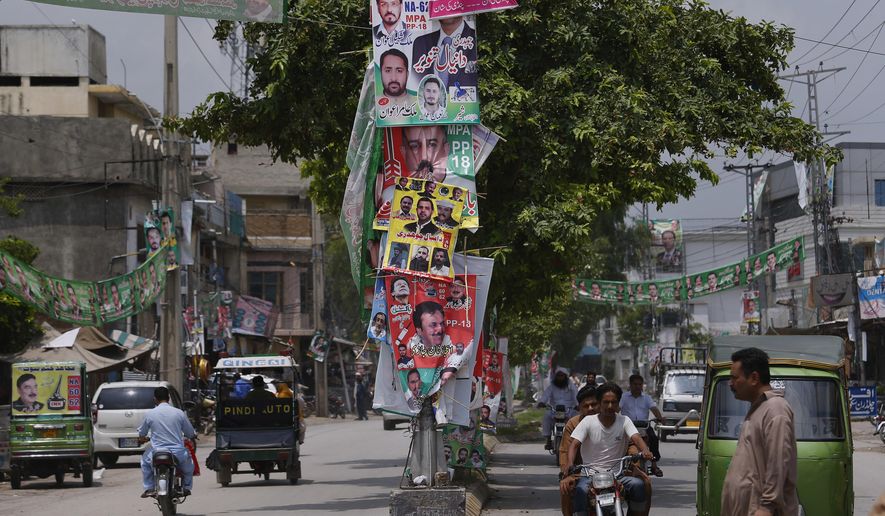
ISLAMABAD (AP) - Pakistanis are to vote on Wednesday in the third consecutive general elections in their nation’s 71-year-long history to take place without political upheaval, a crisis or a military intervention.
Four military governments had ruled Pakistan[1] for almost half of its existence and in its young democracy, no civilian prime minister has ever completed a full, five-year term in office without some sort of crisis. In some cases, parliaments were dissolved, a prime minister was ousted or replaced, the military staged a coup or early elections were forced.
Here is a timeline encompassing major political and other events in Pakistan[2]’s history:
__Aug. 14, 1947: Pakistan[3] emerges as a sovereign state after getting independence when the departing British left India and split the subcontinent;
__Sept. 11, 1948: Pakistan[4]’s founder Mohammad Ali Jinnah dies;
__Oct. 16, 1951: Pakistan[5] first prime minister, Liaquat Ali Khan, is assassinated in a gun attack at a rally in the city of Rawalpind, triggering political instability;
__Oct. 7, 1958: President Iskander Mirza abolishes the constitution and declares martial law; Gen. Muhammad Ayub Khan, then army chief becomes administrator;
__Oct. 27, 1958: Ayub forces the president to step down; Mirza is sent to exile in Britain where he later dies; Ayub declared himself president;
__March 25, 1969: After months of rioting in West and East Pakistan, Khan hands over power to army chief Gen. Agha Mohammed Yahya Khan;...
__Dec. 7, 1970: East Pakistan-based Awami League wins general elections; Yahya Khan delays transfer of power, triggering widespread rioting in East Pakistan; civil war breaks out;__Dec. 16, 1971: Pakistan[6] troops surrender in East Pakistan after Indian armed intervention in the civil war; East Pakistan becomes independent Bangladesh;__Dec. 20, 1971: Yahya Khan resigns, Zulfikar Ali Bhutto becomes president; a parliamentary system of government is adopted and Bhutto becomes prime minister;__July 5, 1977: Army chief Gen. Ziaul Haq seizes power;__April 4, 1979: Bhutto is hanged after the Supreme Court upholds death sentence on charges of conspiracy to murder and Gen. Zia rejects a mercy petition; Bhutto’s daughter, Benazir Bhutto, takes up her father’s legacy;__Aug. 17, 1988: Gen. Zia dies in a mysterious plane crash;__Nov. 16, 1988: Benazir Bhutto becomes Pakistan[7]’s first woman prime minister;__Aug. 6, 1990: Benazir Bhutto’s government is dismissed amid charges of corruption and mismanagement;__Oct. 24, 1990: Parliamentary elections are held and Nawaz Sharif becomes prime minister;__April 19, 1993: President Ghulam Ishaq Khan dismisses Sharif government on corruption charges but the Supreme Court reinstates Sharif; Sharif and Khan fail to reconcile and end conflict so the then-army chief Gen. Waheed Kakar forces both to resign;__Oct. 6, 1993: Bhutto is voted back into power after mass demonstrations lead to the early dismissal of her 1990 successor, Sharif;__Nov. 5, 1996: Bhutto’s government is again dismissed amid renewed charges of corruption and incompetence raised by her party’s leader, Farooq
